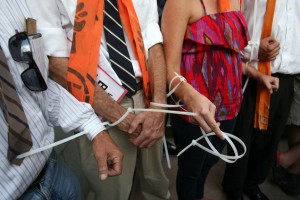
“I am here today because I have chosen to protect the people locked out of the system over the profits of the corporations running the system. I say this not because I want your mercy, but because I want you to join me.”
These are the words spoken by Tim DeChristopher, a climate activist, college student, and now convicted felon, just moments before receiving a two-year jail sentence from a federal court in Salt Lake City. DeChristopher is facing two felony charges for bidding on parcels of Utah wilderness in a valiant effort to protect them from the clutches of oil companies.
Because of his courageous act, DeChristopher might some day be remembered amongst the long list of prominent figures who employed civil disobedience to effect change, including Mahatma Gandhi, Dr. Martin Luther King Jr., and John Lennon, all of whom relied on the sole power of nonviolent demonstration to inspire changes in legislation or policy. It takes an incredible amount of bravery and passion to step forward and openly express dissatisfaction with the status quo. When DeChristopher bid on and won 14 parcels of land, he saved over 22,000 acres of land from being devastated by oil and gas development. This act alone continues to stir up support for the climate movement, and the number of acres his leadership will ultimately save is impossible to estimate.
“I’ve been scared for my future for a long time. And I think the scariest thing that I see is staying on the path that we’re on right now. Obedience, to me, is much scarier than going to prison.”
Nonviolent action has been a central characteristic of many notable social movements throughout history. A few acts of nonviolence have the capacity to progress such movements by leaps and bounds. People sympathize with nonviolence, people can identify with wanting change without wanting to induce violence and destruction. Yes, civil disobedience does run the risk of arrest, as DeChristopher’s case demonstrates. But sometimes, we must step outside of ourselves and fight (nonviolently, of course) for something much greater. What we fight for will always vary, but these movements almost always revolve around fighting for the rights of the oppressed, around creating a voice for those who remain unheard.
Accordingly, DeChristopher’s nonviolent act has galvanized the climate movement in a way that will be hard to ignore.
Injustice and dissatisfaction with the law have a way of recurring in the world. Some choose to quietly abide by these unjust rules, some want change but don’t know how to go about it, and some feel it’s a moral obligation to create the change themselves. DeChristopher’s words say it best:
“The reality is not that I lack respect for the law; it’s that I have greater respect for justice. Where there is a conflict between the law and the higher moral code that we all share, my loyalty is to that higher moral code.”
The climate movement is standing on the edge of something big. The passion, peaceful actions, and comradeship of those involved have the power to save our planet’s beautiful landscapes, one parcel at a time.
I’ll leave you with the inspiring words of another famous practitioner of civil disobedience who summed it up nicely when he said:
“Must the citizen ever for a moment, or in the least degree, resign his conscience to the legislator? Why has every man a conscience, then? I think that we should be men first, and subjects afterward. It is not desirable to cultivate a respect for the law, so much as for the right. The only obligation which I have a right to assume is to do at any time what I think right.” –Henry David Thoreau, Civil Disobedience